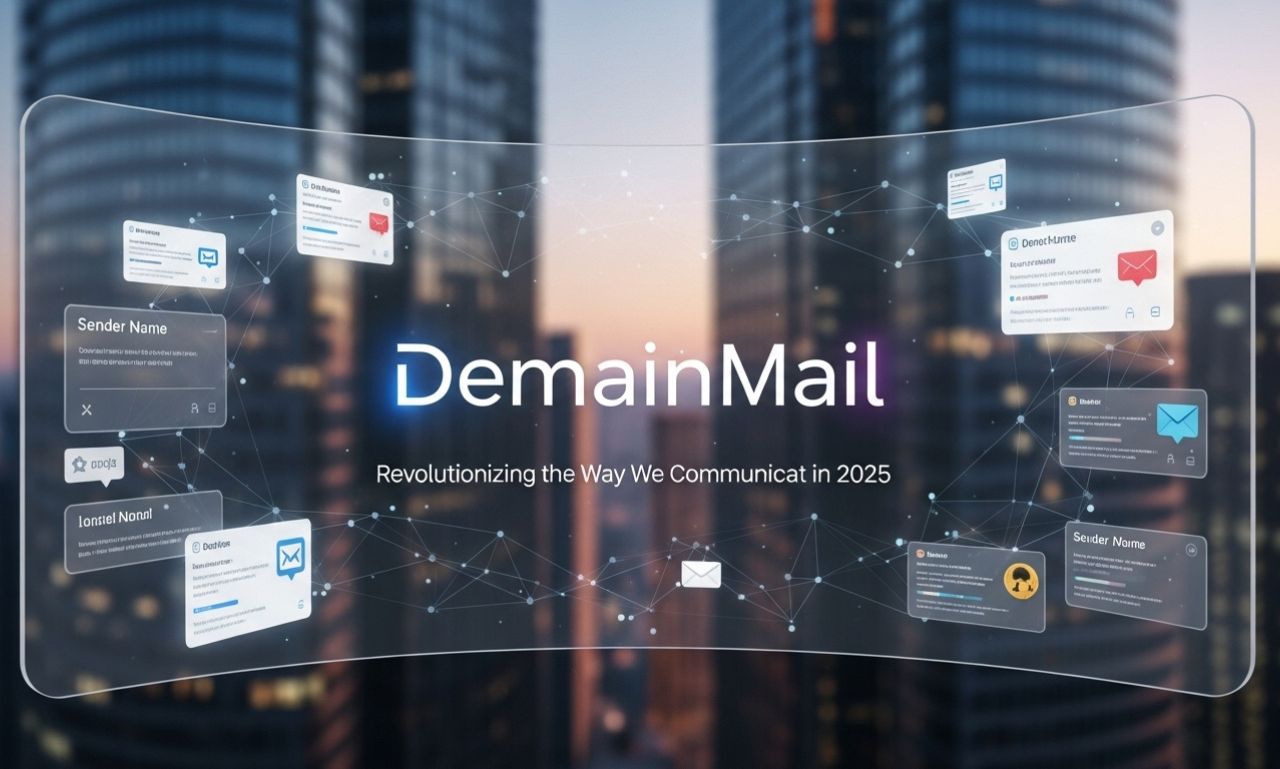Temporary email addresses have become a staple tool for privacy-conscious users—and among the growing crop of disposable-email services, Demainmail is quickly gaining attention. But is it really safe? And does it deliver on the promise of anonymity and reliability? In this guide, you’ll discover exactly how Demainmail works, how it protects your data, how it stacks up against alternatives, and when (and when not) to rely on it.
What Is Demainmail?
If you’ve ever wanted to sign up for a service or newsletter without giving away your real email — to avoid spam, protect your primary inbox, or simply keep things anonymous — that’s the use-case for Demainmail. It’s a temporary / disposable email service that creates short-lived aliases or inboxes you can use instead of your permanent address.
- Demainmail lets you generate one-time or short-lifespan email addresses.
- Emails sent to those addresses are forwarded (or viewable), then discarded after a certain time or on request.
- The idea is to “mask” your real inbox, reduce exposure to spam or trackers, and give you more control over your online identity.
What sets it apart is its emphasis on privacy and security: fewer logs, possibly encryption (depending on the service’s setup), and policies designed to limit your footprint.
Why Privacy & Security Matter in Temporary Email Services
Using a disposable or temporary email isn’t just about hiding your real address — there are real risks tied to poor—or malicious—implementation:
- Spam, phishing & credential leaks: If your permanent address is exposed through signups, it becomes a target for spam or phishing campaigns. Temporary emails help reduce that risk.
- Tracking & metadata exposure: Even disposable addresses accumulate metadata (IP logs, timestamps, headers). A service that keeps those logs for long or sells them could compromise privacy.
- Account access issues: Some services block or deny access to emails sent from “disposable email providers.” A service needs good domain reputation to avoid being blacklisted.
- Retention & deletion policies: Does the service keep copies of the emails? For how long? Under what legal jurisdiction? Are they stored encrypted? These are critical to trustworthiness.
Because of these risks, it’s not enough for a temp-mail service to simply work. A truly privacy-first provider needs clear policies, strong security practices, and usability that avoids pitfalls.
Demainmail’s Core Security Features

Based on what is publicly available, here’s how Demainmail addresses those security concerns:
- Data retention & deletion policy
- Temporary email services must define how long they hold inbound messages. If Demainmail automatically deletes messages after a set time or on user command, that’s a plus for privacy.
- Look also for whether metadata (sender IP, headers, access logs) is stored beyond that period.
- Encryption & transport security
- It should support TLS/SSL for message transport (in-transit encryption).
- If it offers any encryption‐at‐rest (on server), that strengthens protection in case of server compromise.
- Anonymity & metadata minimization
- Does Demainmail require registration? Does it log your IP address? Does it maintain any persistent identifier?
- A strong service will minimize logs or anonymize them quickly.
- Protection against abuse & spam
- Because disposable-email domains are sometimes abused by spammers, a good service must have anti-abuse filtering and reputation-management for its domains.
- Domain reputation matters: if the domain is frequently flagged, many websites will block its use.
- Access control & anti-tampering
- Two-factor authentication (if applicable), rate limiting, secure web interface (HTTPS), and audit-style protections help prevent misuse or unauthorized access to someone else’s temporary inbox.
Combined, those features determine whether the service is “secure enough” to recommend for privacy-sensitive sign-ups or casual use.
Usability & Reliability — Why It’s Top-Rated Among Users
Aside from security, the other side of the coin is how well it works in real life. Even the most private service fails if it’s clunky, slow, or blocked by websites.
Here’s what many users look for:
- Ease of creating aliases — instant generation, customizable alias names or domains
- Delivery speed & uptime reliability — inbound messages should arrive promptly and without failures
- Interface quality — clean UI / UX, mobile-friendly layout, browser compatibility
- Support & transparency — are there status pages or feedback forums? Are downtime or outages rare?
If Demainmail delivers on these, that explains why people rate it highly. Some of the reviews mention that its interface is user-friendly and that the service feels modern. Voices Together+1
Also, because many people use temporary-email services for one-time signups or trials, reliability (i.e. no delays, no missed verification emails) is essential.
Comparing Demainmail With Other Temporary Email Services
To really understand whether Demainmail is “top-rated,” you need comparison with the alternatives:
| Service | Pros | Cons / Limitations |
|---|---|---|
| Demainmail | Focused privacy features; modern interface; reportedly good performance Voices Together+1 | Possible limitations depending on alias lifetime or policy transparency |
| TempMail | Very popular; many domain choices | Sometimes blocked by sites due to being well-known disposable domain |
| 10MinuteMail | Simple and quick; no registration | Very ephemeral; cannot receive long-lived messages or rely on for multi-step signup |
| Guerrilla Mail | Robust / established | Interface may feel dated; less emphasis on encryption or metadata minimization |
| SimpleLogin alias-style services | Provides email-alias forwarding; better longevity | Usually tied to your real inbox; less “throwaway” style anonymity |
When Demainmail Beats Alternatives

- If you need better security / anonymity than generic disposable addresses
- If you want more control or privacy-focused domain(s)
- If you want to avoid being blocked by websites that blacklist common disposable-email domains
When It Might Not Be Ideal
- If you need long-term access for account recovery (because temporary/inactive aliases may expire)
- If you require attachments or large files (some disposable-mail services limit attachments, folder structure, etc.)
- If you want an alias that never expires — in that case an alias-forwarding service (like SimpleLogin) might be a better match
How to Use Demainmail Safely (Best Practices)
Even the best temporary-email service has caveats. Here’s how to get maximum privacy & zero surprises when using Demainmail:
- Use it for one-time signups & trials
Whenever you want to test a service (app, forum, free trial), supply the temporary address rather than your primary inbox. - Check blacklist / domain acceptance
Some websites automatically reject emails from disposable email domains. If Demainmail domains are recognized, you may need to try alternative domain aliases it provides or fallback options. - Don’t rely on it for account recovery
Because you may lose access to the temporary inbox later, or it may be deleted after a time, resist using it for essential accounts. Use your real email for critical logins, password resets, or two-factor flows. - Monitor alias lifetime
Know how long your temporary address remains active. Delete it when you’re done. If Demainmail allows manual deletion, use that. - Avoid exposing sensitive personal data
Temporary email helps hide your inbox — but it doesn’t remove responsibility. Don’t include sensitive personal information (e.g. identity documents) via a temp address unless the service explicitly supports encrypted attachments / secure transfer. - Combine with other privacy hygiene steps
- Use a VPN or trusted network when accessing disposable-email services to avoid exposing your real IP.
- Pair with strong passwords or password-manager usage.
- Be aware of cookies, tracking pixels, etc. while signing up on sites.
By following these practices, you harness the benefits of Demainmail without inadvertently lowering your security posture.
Pricing, Plans & Limitations
An important factor in choosing a disposable-email service is whether features are locked behind paywalls, and what limitations exist:
- Is Demainmail truly free, or does it offer both free & premium tiers?
- What are the caps on message volume, alias creation, or lifetime of alias?
- Are attachments supported? Are there size limits?
- Is the service covered by robust Terms of Service / privacy policy (which states jurisdiction, liability, transparency about logging or abuse)?
Before you use it for anything important, review its policy page. If you’re planning to trust beyond simple trials, see whether premium plans offer extended retention, custom domains or higher reliability.
If you want detailed checklists on terms & policy comparison, check our guide on operational procedures and documentation—for instance see our linked resource on Protocolo Operacional Padrão on itechzilla.
You can read more about operational-procedure best practices here: Protocolo Operacional Padrão
FAQs
Is Demainmail completely anonymous?
Not always. While it masks your real email, true anonymity depends on whether Demainmail stores metadata such as IP addresses and login times. Unless the provider gives a no-log guarantee or anonymizes logs, some trace may remain.
Can I use Demainmail for account recovery or as a secondary permanent email?
It’s not recommended. Temporary-email aliases are typically not permanent. If you lose access, or if the alias expires, you could lose access to the recovery flow. Always use your main email for critical recovery.
Will using Demainmail put me at risk of being blocked by services that disallow disposable email addresses?
Yes. Some websites detect and block known disposable-email domains. Demainmail may or may not be on their list. If you run into blocks, you may need to use a different alias-domain or fallback to a non-disposable address.
How long do temporary addresses last with Demainmail?
That depends on the policy. Each alias may have a lifespan (e.g. minutes, hours, days). Check Demainmail’s terms or dashboard settings for “expiration after inactivity” or “delete alias” features.
Final Verdict — Should You Use Demainmail?
If you’re looking for a privacy-first way to manage one-off signups, avoid spam, and limit exposure of your primary inbox, Demainmail is a strong contender. Its focus on security, potentially encryption and modern usability gives it an edge over many generic disposable-email services.
However: don’t treat it as your primary or long-term solution. For critical accounts (banking, password recovery, or multi-factor flows), use a more permanent email or alias system with recovery options. Also, always check the policy and ensure you know when your alias expires.
In short: Demainmail is an excellent tool — use it smartly, with awareness of its strengths and limitations.
Getting Started Guide (Quick Steps)
Here’s how you can begin using Demainmail safely and efficiently:
- Visit the Demainmail site / sign-up page.
- Create your temporary alias (choose domain if offered).
- Copy the alias address. Use it to register for a service or trial.
- Wait for incoming email (verify that delivery works).
- After you’re done with the signup / verification, delete or expire the alias if the service allows.
- Keep a note (or screenshot) of the alias lifetime / expiration policy in your dashboard.
- For future signups, reuse or create fresh aliases as needed; avoid reuse for sensitive or repeated accounts.

